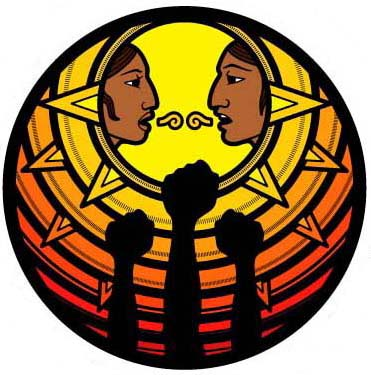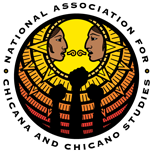|
General Information |
NACCS 2026 Call For Proposals
Resistance and Re-existence | Resistencia Y Re-existencia
Deadline for Proposals: CLOSED
Location: Yanaguana, (San Antonio, TX)
Hotel: The St. Anthony (For link and information on the NACCS hotel & group rate, see section below call)
Conference Dates: April 1-4, 2026


A reminder NACCS membership follows a fiscal year term which begins on July 1 and expires June 30th.
Renew now. NACCS requires a current membership for conference presenters in addition to conference registration.
In this moment of heightened authoritarianism and corruption—marked by illegal deportations and raids, the dismantling of federal institutions and scientific research, genocide, war, attacks on constitutional rights, disinformation campaigns, and systematic assaults on law, health, ethnic studies, books, the trans community, social safety nets, and all programs working for equity (to name a fraction)—Chicana/o/x scholars must engage contemporary forms of resistance with both urgency and wisdom.
Yet these conditions are neither new nor surprising. Indigenous, Chicana/o/x, and student communities have been fighting injustice for generations, developing sophisticated strategies of survival, resistance, and flourishing that extend far beyond reactive responses to oppression. As we commemorate 700 years since the founding of Tenochtitlan, we remember our persistence through invasions, corrupt institutions, and settler colonial projects and also evoke the beautiful and powerful forms of resistance marshaled by our communities.
Thematic Frameworks
This conference centers two interconnected concepts that emerge from Indigenous and decolonial scholarship:
Resistance (Resistencia) encompasses the multiple forms of opposition, refusal, and counter-hegemonic practices that challenge systems of domination. Drawing from James C. Scott's "weapons of the weak," Gloria Anzaldúa's "mestiza consciousness," and contemporary scholars like Leanne Betasamosake Simpson's "radical resurgence," we understand resistance as both spectacular acts of defiance and everyday practices of survival and dignity. From subtle, everyday acts of defiance by the disempowered to the transformative forging of new consciousness and the active rebuilding of self-determined ways of being, targeted communities continually assert their agency.
Re-existence (Re-existencia), as conceptualized by Adolfo Albán Achinte and other decolonial theorists, moves beyond mere resistance to encompass the creative, life-affirming practices through which communities reconstitute themselves, their knowledge systems, and their ways of being in the world. Crucially, re-existence refers to indigenous cultural productions, ceremonies, knowledge systems, and ways of life that exist on their own terms—not as reactions to or defined in relation to settler colonial projects, but as autonomous expressions of indigenous ontologies and epistemologies. Re-existence involves the active creation of alternative realities, the revitalization of ancestral wisdom, and the generation of new forms of collective life that emerge from indigenous cosmologies and relational ways of being.
The Call
As historians, literary scholars, social scientists, artists, poets, and sentipensantes, the conference theme inquires: What does resistance and re-existence look like where we stand? How do Chicana/o/x scholars and communities exist, thrive, and research in ways that center life-giving practices? What forms of resistance emerge through our scholarship, research, creative works, mentoring, land/water protection, community work, and activism? Borrowing from Octavia Butler, in what ways does our scholarship allow us to “dream beyond the crisis”?
We welcome submissions employing community-based research that centers community knowledge and priorities, decolonial methodologies, ceremonial and arts-based research, and oral history and testimonial approaches. We encourage interdisciplinary and transdisciplinary methods that cross academic boundaries.
We invite diverse forms of scholarly and creative presentation that facilitate dialogue, including individual papers, thematic panels, roundtables, workshops, creative presentations incorporating performance, or posters.
Conference Themes
We call for proposals that explore resistance and re-existence through multiple lenses and approaches, including but not limited to:
1. Genealogies of Resistance
Historical analyses that trace Chicana/o/x resistance movements from pre-invasion indigenous responses to colonization through contemporary struggles, while examining how communities have continuously recreated and reconstituted themselves through these struggles.
2. Decolonial Pedagogies, Epistemes, and Knowledges
Scholarly investigations of how Chicana/o/x communities resist colonial epistemologies while simultaneously re-existing through the creation, maintenance, and transmission of knowledge systems. This includes educational practices, storytelling traditions, and intergenerational knowledge sharing that serve as both resistance to imposed academic paradigms and the active reconstruction of ancestral wisdom for contemporary contexts.
3. Creative Re-existence: Art, Literature, and Cultural Production
Explorations of how Chicana/o/x artists, writers, and cultural workers engage in acts of resistance or generative re-existence through aesthetic practices while simultaneously creating new worlds, identities, and possibilities through their work.
4. Embodied Resistance and Re-existence
Research examining how resistance manifests through the body as a site of refusal, while exploring how traditional healing practices, food sovereignty, ceremony, and holistic wellness approaches constitute forms of re-existence that reconstruct relationships between body, spirit, community, and land.
5. Re-existence with the Sacred Elements
Studies of how Chicana/o/x communities protect and restore relationships with land and water, challenging extractive capitalism while actively re-existing through the reconstruction of reciprocal relationships with the Earth, restoring ancestral ecological knowledge.
6. Digital Planes of Resistance and Re-existence
Examinations of how Chicana/o/x communities utilize technology for resistance or contemplating re-existing through the creation of alternative digital spaces, preservation of cultural knowledge, and the development of community-controlled technologies.
7. Intersectional Resistance and Re-existence
Research examining how resistance operates at the intersections of race, class, gender, sexuality, ability, and other identity categories, or exploring how Chicana/o/x communities re-exist through the creation of new forms of identity, kinship, and belonging that transcend colonial categories.
8. Economic Re-existence and Community Self-Determination
Research on how alternative economic models, cooperative enterprises, and community-controlled development initiatives resist capitalist exploitation while simultaneously re-existing through the creation of economies based on reciprocity, sustainability, and collective well-being.
9. Sanctuary and Solidarity: Resistance and Relationality
Research on how Chicana/o/x communities create spaces of protection and mutual aid that resist state violence, kidnapping, family separation, etc. while simultaneously re-existing through the construction of alternative social relations based on care, reciprocity, and interdependence.
10. Liberatory Futurities
Explorations of how Chicana/o/x communities resist apocalyptic narratives and systemic despair while re-existing through the active imagination and construction of liberatory futures. Envisioning liberatory practices, organizing, ceremony, and intergenerational knowledge transmission create alternative temporalities that honor ancestral wisdom while generating new possibilities for collective thriving.
Review Process
All submissions will take place at naccs.org and will undergo peer review by a committee of NACCS members representing diverse disciplines and approaches. Selection criteria include: Relevance to conference theme, Scholarly rigor and innovation, Contribution to Chicana/o/x Studies, Methodological sophistication, Potential for community impact.
Proposal Submissions no longer available.
¡La lucha sigue! National Association for Chicana and Chicano Studies (NACCS)
Committed to activist scholarship and community engagement since 1972

HOTEL INFORMATION:
The St. Anthony - 300 East Travis Street, San Antonio, Texas 78205
THE LUXURY COLLECTION HOTELS & RESORTS
Here's the reservation link NACCS members can use to make reservations:
National Association for Chicana and Chicano Studies Group Rate Link
Discount Start Date: Saturday, March 28, 2026
Discount End Date: Wednesday, April 08, 2026
Hotel(s) offering NACCS special group rate:
- The St. Anthony, a Luxury Collection Hotel, San Antonio for 199.00 USD per night - Last Day to Book : Tuesday, March 10, 2026
- Select your check-in / check-out dates prior to clicking on "Check Availability"
- 48 Hour Cancellation Policy


